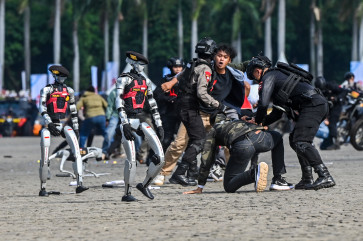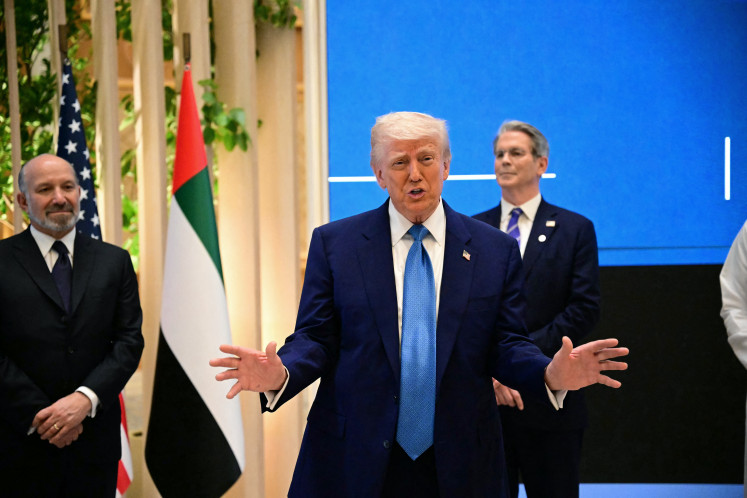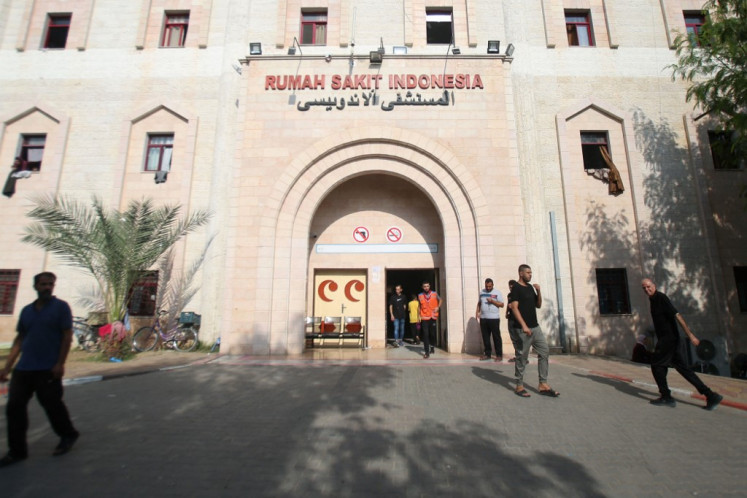Popular Reads
Top Results
Can't find what you're looking for?
View all search resultsPopular Reads
Top Results
Can't find what you're looking for?
View all search resultsFaisal Ismail: An Indonesian-style democracy for Islamic countries
JP/Simon SudarmanDemocracy in Indonesia may not be perfect, according to Faisal Ismail
Change text size
Gift Premium Articles
to Anyone
JP/Simon Sudarman
Democracy in Indonesia may not be perfect, according to Faisal Ismail. But the 67-year-old professor from Sunan Kalijaga State Islamic University in Yogyakarta says it's a worthy inspiration for Islamic countries.
Faisal is in a good position to make the comparison: The native of Madura, East Java, was Indonesia's ambassador to Kuwait and Bahrain from 2006 to 2010 and the secretary-general of the Religious Affairs Ministry.
He continues: 'In democratic life, Indonesia only scores a 75 for having not yet achieved maturity. However, compared with Islamic countries, Indonesia should deservedly inspire their democratic practice.'
Democracy, for Faisal, is closely related to religious tolerance, and the level of democratic 'maturity' is proportional to the level of tolerance. Indonesia is currently in its process of maturation.
These are the issues that Faisal has been considering since obtaining a master's degree in history from Columbia University in the US in 1988 and a doctorate from McGill University in Canada in 1995, where he's lectured, as well as at the University of Malaya's Institute for Islamic Studies in Kuala Lumpur.
'As Indonesia becomes democratically mature, religious tolerance will follow. With high tolerance, multiculturalism will take shape even better, in which ethnic groups, religions and others will favorably develop, reflecting Indonesia's unity in diversity,' he says.
For Faisal, tolerance, which signifies mutual acceptance and respect, can be created by fostering frequent dialogues and gatherings, both individually and collectively. 'Such meetings should be held on an equal footing. They do not necessarily need to discuss religion, but they can talk about everyday life.'
'I salute Muslims who work in [Catholic-owned] companies. They have practiced tolerance,' in contrast to Muslims who work for Muslim-owned companies, he adds.
Faisal identifies two types of dialogues that he would like to see more of: theological dialogues, which promote mutual understanding of different faiths, and life dialogues, which actualize respective religious teachings, such as in joint efforts to fight corruption and crime.
'In this way, the government should play the role of managing and motivating the building of this communicative atmosphere, without making much intervention.'
He cites the American model, where religion is a personal affair and religious life has not been contentious. 'Their friction involves ethnic issues rather than religion. Therefore, in a democracy, we can't make a comparison with America. Our democracy isn't mature yet, so that in religious life government intervention is still needed, but it's only provisional in nature. With its maturity later on, such intervention won't be necessary.'
Despite cases such as attacks on Ahmadiyah congregations and the permit problems for the GKI Yasmin Christian congregation in Bogor, interfaith relations in Indonesia have been progressing, he said. 'Under these circumstances of religious tolerance in Indonesia, I think the award received by President Susilo Bambang Yudhoyono some time ago, positioning Indonesia as a tolerant country, is worthy and bears no political weight.'
On Ahmadiyah, the minority Muslim sect, Faisal was realistic. 'The problem just comes from the grass-roots level, which is easily influenced and thus arouses concern. They should have a dialogue so as not to attack the group and live in harmony. We're heading for such mature tolerance and I'm sure it will materialize after two generations.'
Faisal, who has visited 24 countries in Asia, the Middle East, Europe, America and Africa for religious programs, cautioned that tolerance should come from within and be manifested as an example in one's family, neighborhood, community and so forth. 'Tolerance should be an example. Talking without action is hypocrisy and in terms of identity, our nation also only scores 75.'
To nurture this attitude, Faisal suggested education. 'Multicultural education should be provided from primary school to college levels so as to avoid exclusivity. An independent subject should be taught besides field visits.'
He described the universal nature of tolerance without overlooking local cultures, while mentioning the US and Canada as highly tolerant nations, besides Singapore for the Asian region. 'So we should boost tolerance typical of Indonesia, characterized by the acceptance of a unitary state with diverse ethnic groups, religions, cultures and other facets constituting one nation of Indonesia.'










